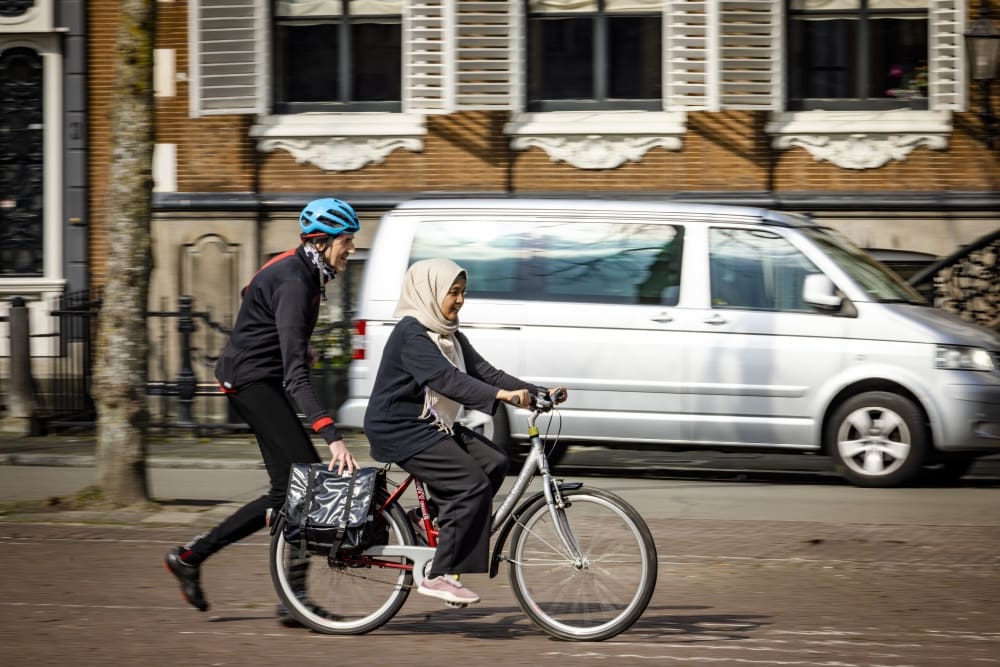Cycling
Much of the Netherlands is deliberately designed to make cycling the quickest, easiest and cheapest way to get around. Dutch cycling infrastructure is some of the best in the world, and cycling in most areas is easy due to the flat landscape and many cycling paths. But for new residents, figuring out the rules can be daunting, and knowing where to get a bike can be tough, too. Here’s what you need to know to get started cycling in the north.
Buying a bike
We recommend buying a used bike. Used bikes are a good idea because new bicycles tend to be targeted more frequently for theft. You can just walk into the nearest bike shop to your house and ask about their tweedehands fietsen (second hand bikes, or used bikes). On average, second hand bikes cost between €100 and €200. To be sure you are not purchasing a stolen bike, you can check the Government’s stolen bicycles register.
Correct bike frame size
No matter where you buy your bike, be sure to give it a test “drive” before purchasing it, and find one with a low enough frame and seat so that your feet can be flat on the ground when you stop without having to get off the bike saddle. Bike seats can also be lowered, and the saddle should come up to your hips when you stand beside it. There’s no shame in asking for a children’s bike if that is the right height for you.
Another option: Swapfiets. For a monthly fee, these blue-tire bikes can be swapped out if they are broken or damaged – but again, check the frame to make sure you can bike (and stop) safely and comfortably.
For those with mobility issues, you can also buy an e-bike, a tricycle (driewieler) designed for adults, or a recumbent bike (ligfiets). Some employers have programs to incentivize their employees to commute to work by e-bike, so check at your workplace if there is a scheme for discounted e-bikes or possibly even free bicycles for staff.

Locks and helmets
When you are at the bike shop, make sure to buy (at least one) thick bike lock chain. Bike theft is an unfortunate rite of passage for Dutch citizens and internationals alike, and those bikes are often turned right around and sold again. If you have access to a private bike shed, using it is highly recommended. You can also buy battery-powered tie-on bike lights, bells and saddle bags (useful for grocery shopping) at most bike shops.
If you would feel safer with a bike helmet, you can also buy one either at the bike shops or sporting goods stores in your area. Dutch drivers are generally very attentive in traffic and are aware of bikes around them (because they are cyclists too). For children, especially when they are still learning to bike, it is increasingly common to wear helmets.
Bike parking
There are usually bike racks, designated sidewalk parking areas (with a special tile with a bike on it), or monitored underground bike parking garages in most city centers.
However, you can’t just leave your bike parked indefinitely: at locations like train stations, shopping streets and most bike parking garages, there’s a maximum parking period of 12 days. After that, it will be towed to the local AFAC (Algemene Fiets Afhandel Centrale; General Bicycle Processing Center).
The AFAC is a central location in bigger cities where all bikes which have been moved due to being parked incorrectly (i.e. the middle of the sidewalk), stolen or abandoned are kept. If a stolen bike shows up there, the rightful owner can retrieve it for free, but if you need to reclaim your bike which was moved for being wrongly parked, you’ll need to pay a fee of €25. Bikes are kept at the AFAC facilities for at least 13 weeks, then put up for resale.
Groningen: Travertijnstraat 4
Leeuwarden: Voltastraat 11
Emmen: Stationsplein 1
Groningen: Bikes (that are unclaimed) from the AFAC are resold by the municipality (gemeente) at GoudGoeie fietsen (Protonstraat 6) or Refidé Bikes (Blauwborgje 12 on the Zernike Campus). Prices start at €80 (payment by card only), and all the bikes there have been thoroughly inspected to ensure their locks and lights are working properly, and – most importantly – are not stolen.
Leeuwarden: Bikes that go unclaimed at the AFAC are checked for working brakes and lights, and then put up for sale at Estafette second hand stores in the city. It’s also an option to get a modified bike through the municipality if you have a physical disability or other specialized needs.
Emmen: Unclaimed bikes from the AFAC in Emmen are resold second hand at Ben Kwijt.
If you live in Groningen and need to learn how to ride a bike, or would just like to better understand Dutch traffic rules for bikes, you can join one of IWCN’s regular FietsFriend Festival events. Keep an eye on our event’s calendar.
You can contact the Fietsersbond anywhere nationwide to see about scheduling one-on-one lessons with professional cycling coaches.
Traffic in the Netherlands booklet